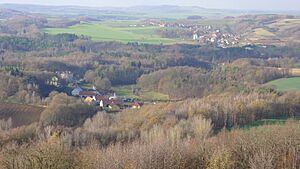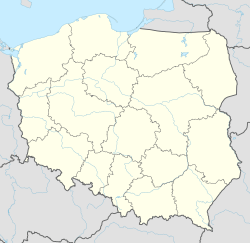Jerzmanice-Zdrój facts for kids
Quick facts for kids
Jerzmanice-Zdrój
|
|
|---|---|
|
Village
|
|

Jerzmanice-Zdrój seen from Wilcza Góra
|
|
| Country | |
| Voivodeship | Lower Silesian |
| County | Złotoryja |
| Gmina | Złotoryja |
| Population | 770 |
Jerzmanice-Zdrój is a small village located in the southwestern part of Poland. It's part of the Złotoryja area in the Lower Silesian Voivodeship. For a while, between 1975 and 1999, it was part of a different region called Legnica Voivodeship.
The village is about 4 kilometers (2 miles) southwest of Złotoryja and 82 kilometers (51 miles) west of Wrocław, which is a big city and the capital of the region. It sits right by the Kaczawa River.
A Look Back in Time
People have lived in the area around Jerzmanice-Zdrój for a very long time, even since the Neolithic Age (New Stone Age). Over many centuries, the village grew and changed.
It had a church that was built in the 14th century. For a long time, from 1527 to 1945, this church was used by Protestants. The village also had a rectory, which is the home for a priest.
Jerzmanice-Zdrój was once home to two large palaces. The first one existed from 1541 until 1974. The second palace was built between 1904 and 1906 but was gone by 1945. There were also several manors, which were like large country houses.
The village had important workshops too, like a smithy (where metal was worked) that has been around since 1714. There was also a watermill, an inn, and three taverns where people could gather. People also did weaving here, and there was a grange (a farm building) and a leat (a water channel).
From 1881 to 1940 or 1945, Jerzmanice-Zdrój was a special place called a spa. People would come here to relax and get healthy. During World War II, some children were sent here for safety.
Jerzmanice-Zdrój Today
Today, Jerzmanice (the shorter, unofficial name) is the fourth-largest village in the Gmina Złotoryja area. About 770 people live here. The village administrator, who helps manage the village, is Edward Janiec.
Important Places
The St. Anthony Church is now used by the Roman Catholic Church. It's a branch church of the main parish in Złotoryja.
In the eastern part of the village, you can find the "Raven Rocks." This is a group of rocks that are incredibly old, about 90 million years old! Underneath these rocks, there's a special spring called the St. Hedwig of Silesia spring. The way the spring looks today was created in the 19th century, but people believe the spring was first used way back in the 13th century.
Right next to the Raven Rocks, there's a train station that opened in 1895. In the middle of the village, you'll see a grange, which is a farm building that was built in the late 1890s. In 2018, the local school in Jerzmanice-Zdrój closed because of changes to the education system in Poland.
Beliefs and Community
Most people in Jerzmanice-Zdrój are Roman Catholic, about 90% of the population. However, only about 20% of them regularly attend church. There are also a few Jehovah's Witnesses living in the village, and some people who are Atheists, meaning they don't believe in a god.


